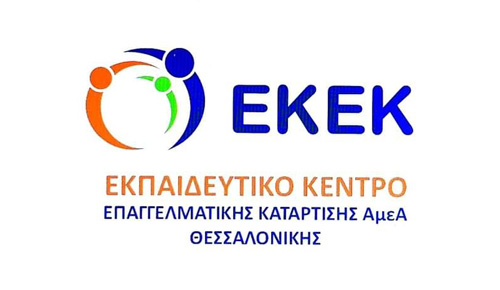ΕΚΕΚ ΑμεΑ Θεσσαλονίκης
How the Agricultural Department prepares students for real work placement
by Anastasia Anastasiadou and Zografia Xanthopoulou
Published 31/10/2022

by Anastasia Anastasiadou and Zografia Xanthopoulou
Published 31/10/2022
EKEK AMEA of THESSALONIKI is a vocational school for people with disabilities who have completed their compulsory education. The school is part of the Manpower Employment Organization, that recently changed its name into Public Employment Services. The main goal of the school is to prepare students for the world of work and also to help all students, so they will acquire knowledge and skills that will enhance their self-confidence and lead them to the conquest of autonomy. The school has modern laboratories equipped with all the necessary means so that students become familiar with the most propriate way in the specialties of Information Technology, agriculture, carpentry, weaving and cutting sewing. Their preparation is followed by their participation in the work centres so that students have the opportunity to be prepared professionally and to be connected with the labour market. Students are preparing for the most contemporary professions with the greatest demand.
Within the Agricultural Department students have the opportunity to practice in 5 green houses and outside cultivations.
Beneficiaries of this case study were the students of the Working Centre, agricultural with a mild mental disability, aged 18 to 30. Students had the opportunity to get acquainted with professions related to the cultivation and processing of olives as well as the professionals of the field, who gave students the opportunity to work in real working conditions. Professionals also benefited as they came in contact with the students and learned about their special skills.
The case study involved 8 students and 3 professionals. For the selection of students, emphasis was placed on their skills that had already been developed in their basic education and that could be applied in a professional field, as well as priority was given to the students of the work centres that are in the final stage of education. The selection of professionals was based on the proximity of their businesses in the school area, but also on the interest they showed in cooperation with people with disabilities. The field chosen to carry out the case study of the Agricultural Department was the cultivation of the olive and the processing of its products. The selection of this crop was made because it is one of the most important crops in Greece with a high labour demand. This, together with the minimum specialization required by the professions associated with this crop, was the greatest incentive.
To implement the case study of the Agricultural Department, 7 meetings were organized with the students, each of which aimed to familiarize them with the professions related to olive cultivation. At the first meeting students were informed about the action they were going to take and discussed olive cultivation exploring the pre-existing knowledge of this crop. In the next 3 meetings students had the opportunity to meet professionals in their workplace. The students visited an olive grove and after discussing with the producer, they did some work themselves in real field conditions (picture 1). A visit to an olive nursery followed, where students saw the place where small trees are prepared for planting and had the opportunity to practice their skills at the school (picture 2). Visits were closed by visiting a mill in the area where students saw the production line followed for the production of olive oil. At the mill, students were given the opportunity to extract their own olive oil from olives that they had harvested themselves at the meeting that preceded the visit to the mill (picture 3). The olives were harvested by the students on the school grounds and 3 different traditional harvesting methods were applied. At the sixth meeting the students bottled the olive oil they received from the mill. Bottling was done using professional equipment at the school premises. At the meeting the students, using the olive oil in combination with beeswax, prepared ointments which they packed in small jars (picture 4). With this action, they realized the additional income that can be derived from dealing with the production of olive oil. The last meeting was the feedback of action. The student’s impressions were assessed and also their professional and social skills.
By organizing meetings with professionals around a crop, students had the opportunity to know how the professions are connected and the order in which they need to follow them in order to have a final marketable product. The good practice applied in this case study was not only the visits to professionals and real working environments but the connection of all these with one thematic unit. The students gradually discovered their pre-existing knowledge about olive cultivation, observed and experienced a number of professions related to this cultivation, applied the skills and knowledge they have acquired and came into contact with the finished product.
The students developed their social skills. Their contact with professionals helped them develop a professional attitude. As part of their socialization, they shared their experiences with each other as well as with their peers who were not involved in the action. Furthermore, their participation in the various tasks in real work environments strengthened their confidence and I took a step towards their autonomy.
As far as the professionals are concerned, they have had the opportunity to meet the disabled and their potentials. Through this contact the professionals collaborated with the students and realized that they could become their future workforce.
Professional quotes
“I will be very happy if the students come back to my estate”
“I hope for a future cooperation with students”
Student quotes
“I would love to work in an olive nursery.”
“I want to do this job because it’s in nature.”